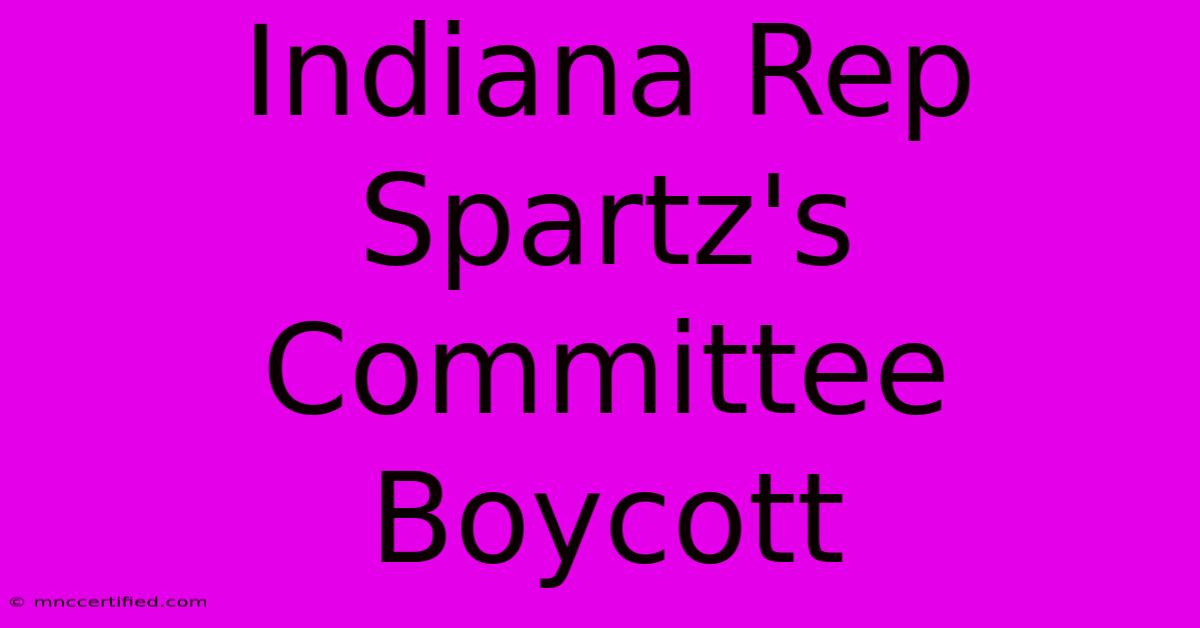Indiana Rep Spartz's Committee Boycott

Table of Contents
Indiana Rep. Spartz's Committee Boycott: A Deep Dive into the Controversy
Indiana Republican Representative Victoria Spartz's decision to boycott House committees sparked significant debate and media attention. This article delves into the reasons behind her boycott, its implications, and the broader political context surrounding the event. We'll examine the criticisms she faced and analyze the potential consequences of her actions.
Understanding the Reasons Behind the Boycott
Rep. Spartz's boycott stemmed from her concerns about the House Republican leadership's handling of certain issues and internal party dynamics. While she hasn't explicitly detailed every grievance, her statements and actions point towards several key factors:
Concerns about Party Unity and Leadership:
Spartz expressed frustrations regarding the perceived lack of unity and internal disagreements within the House Republican caucus. She highlighted a perceived lack of transparency and communication, suggesting a need for more collaborative leadership. Her boycott can be interpreted as a pressure tactic aimed at prompting internal reform and promoting greater cohesion within the party.
Specific Policy Disagreements:
While not explicitly stated, it's likely that specific policy decisions or voting processes fueled her discontent. Analyzing her past voting record and public statements might reveal areas of significant disagreement with the party line, providing further context to her actions. This element requires further research to pinpoint exact policy disagreements.
Strategic Political Maneuvering:
Some observers suggest that Spartz’s actions might be a calculated political move, potentially aimed at enhancing her profile within the Republican party or positioning herself for future opportunities. This theory necessitates examining her political ambitions and future prospects to gain a clearer perspective.
The Implications of Spartz's Boycott
Rep. Spartz's decision carries significant implications:
Impact on Legislative Processes:
Her boycott directly impacts her ability to participate in committee hearings, shaping legislation, and influencing policy decisions. This impacts the overall legislative process, potentially delaying or hindering the progress of certain bills. The extent of this impact depends on the significance of the committees she's boycotting.
Political Fallout and Party Divisions:
The boycott exacerbated existing tensions within the House Republican caucus, highlighting underlying divisions and potentially widening the gap between different factions. This division can weaken the party's overall effectiveness and its ability to present a united front on key issues.
Public Perception and Spartz's Reputation:
The boycott significantly impacts Rep. Spartz's public image. While some may view her actions as a courageous stand against internal party dysfunction, others might see it as disruptive and unproductive. Her reputation will be shaped by how the public and media interpret her motives and actions.
Criticisms and Responses
Spartz faced criticism from various sources following her boycott. Some argued her actions were disruptive and undermined the party's legislative efforts. Others criticized her for not engaging in internal discussions to resolve her concerns before resorting to a public boycott. The response to her actions provides valuable insight into the prevailing political climate and the perception of her role as a representative.
Conclusion: Analyzing the Long-Term Effects
Rep. Spartz's committee boycott represents a significant event in the current political landscape. The long-term effects remain to be seen, but her actions highlight important questions regarding party unity, leadership effectiveness, and the role of individual representatives in expressing dissent. Further analysis is needed to fully understand the lasting consequences of this controversial decision. Future research should focus on analyzing the evolution of the situation, the ultimate resolution (if any), and the impact on the upcoming election cycle. The impact on Indiana voters and her political future will also be crucial elements to monitor.

Thank you for visiting our website wich cover about Indiana Rep Spartz's Committee Boycott. We hope the information provided has been useful to you. Feel free to contact us if you have any questions or need further assistance. See you next time and dont miss to bookmark.
Featured Posts
-
Ana Orsini Arizona News Anchor Dead At 28
Dec 18, 2024
-
Karate Kids Legends Trailer Debuts
Dec 18, 2024
-
Connolly Beats Aoc For Oversight Post
Dec 18, 2024
-
Rlusd Ripples Stablecoin Expands
Dec 18, 2024
-
Jordan North Praises Rnli Rescue Crew
Dec 18, 2024